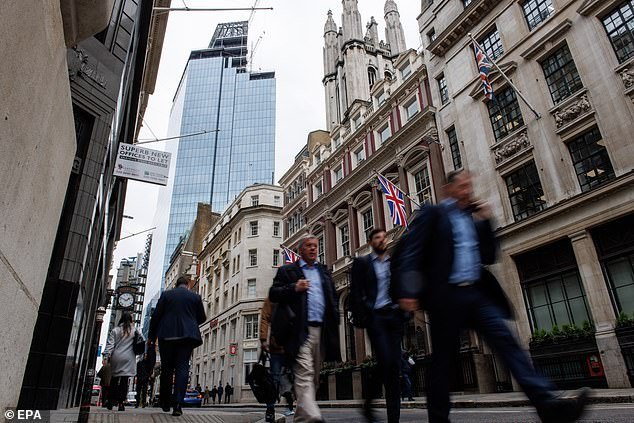Boom time for businesses as Britain’s economic recovery is ‘in full swing’, economists say
- British business surpassed global rivals with the strongest growth in almost a year
- A survey by S&P Global found that private sector activity was gaining momentum
British business has seen its strongest growth in almost a year – outpacing global rivals – in the latest sign that the recession is behind it.
A closely watched survey from data provider S&P Global showed that private sector activity accelerated this month, with the healthiest growth since last May.
Ashley Webb, British economist at Capital Economics, said the report suggests “the economic recovery is well underway.”
Separate figures from lender Nationwide showed households were starting to spend more money on gardening, eating out and holidays as pressure on living costs eases.
And in the city, the FTSE 100 caused even more joy as it hit a new record high.
British business has seen its strongest growth in almost a year – outpacing global rivals – in the latest sign that the recession is behind it. Pictured: Chancellor of the Exchequer Jeremy Hunt

A closely watched survey from data provider S&P Global found that private sector activity accelerated this month, with the healthiest growth since last May (Photo: The City of London)
But hopes that the economic recovery would help provide further relief to struggling households in the run-up to the election suffered a setback as worse-than-expected credit figures reduced Chancellor Jeremy Hunt’s ability to cut taxes .
And to top it all off, the Bank of England’s chief economist, Huw Pill, said there was still ‘a reasonable way to go’ before it could cut rates.
Britain suffered a recession late last year, when the economy shrank for two quarters in a row.
Official figures next month are expected to show that the economy returned to growth in the first three months of 2024, ending the downturn.
S&P’s latest Purchasing Managers Index Survey showed the recovery would continue into April.
The index stood at 54, compared to 52.8 in March. A reading above 50 indicates growth and below 50 indicates shrinkage. The figure put Britain ahead of the US and the eurozone. In Germany and France the private sector has little to no growth.
In Britain, however, there was a stark contrast between accelerating activity in the dominant services sector – which includes bars and restaurants, law and accounting firms – and the manufacturing sector, which moved in the opposite direction.
And yesterday there were also signs that the fragile state of public finances and the ongoing battle against inflation continue to hold back progress.
Borrowing – the shortfall between government revenue and expenditure – stood at £11.9 billion last month, higher than financial markets had expected.
And for the financial year as a whole, ending in March, it totaled £120.7 billion, according to the Office for National Statistics (ONS).
That was £7.6 billion lower than a year ago, but £6.6 billion larger than forecast by the Office for Budget Responsibility (OBR), the government’s tax and spending watchdog.
Cara Pacitti, senior economist at think tank the Resolution Foundation, said: “There are no signs of new fiscal leeway opening up that could allow the chancellor to announce a pre-election budget in the autumn.”
The ONS figures show that the Treasury is raking in record amounts in the form of income taxes – up from £25bn to £273bn for the last financial year – and corporation tax, which has breached the £100bn mark for the first time.
Yet government revenues still fell £5.3 billion short of the OBR’s forecast.
And government spending soared as inflation pushed up the cost of benefits and goods and services paid for by Whitehall departments.
It all contributed to Britain’s debt mountain, which now stands at £2.69 trillion, or 98.3 percent of the size of the entire economy.
Spending on interest on debt alone this year amounted to £78.3 billion – equivalent to £3,600 per household, according to the Institution of Chartered Accountants in England and Wales.
